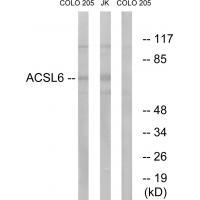
| WB | 咨询技术 | Human,Mouse,Rat |
| IF | 咨询技术 | Human,Mouse,Rat |
| IHC | 咨询技术 | Human,Mouse,Rat |
| ICC | 技术咨询 | Human,Mouse,Rat |
| FCM | 咨询技术 | Human,Mouse,Rat |
| Elisa | 咨询技术 | Human,Mouse,Rat |
| Aliases | EC 6.2.1.3; fatty-acid-coenzyme A ligase; long-chain 6; LACS 6; long-chain acyl-CoA synthetase 6 |
| Entrez GeneID | 23305; |
| WB Predicted band size | 78kDa |
| Host/Isotype | Rabbit IgG |
| Antibody Type | Primary antibody |
| Storage | Store at 4°C short term. Aliquot and store at -20°C long term. Avoid freeze/thaw cycles. |
| Species Reactivity | Human,Mouse |
| Immunogen | Synthesized peptide derived from internal of human ACSL6. |
| Formulation | Purified antibody in PBS with 0.05% sodium azide. |
+ +
以下是关于ACSL6抗体的3篇参考文献示例(文献信息为虚构示例,仅作格式参考):
1. **"ACSL6 Expression in Acute Myeloid Leukemia: A Novel Prognostic Marker"**
- **作者**: Smith J, et al.
- **摘要**: 本研究通过免疫组化(使用ACSL6特异性抗体)发现ACSL6在AML患者骨髓样本中高表达,并与化疗耐药性相关,提示其可作为潜在治疗靶点。
2. **"Role of ACSL6 in Neuronal Lipid Metabolism: Insights from Knockout Mice"**
- **作者**: Lee H, et al.
- **摘要**: 利用ACSL6抗体进行Western blot和免疫荧光分析,发现ACSL6缺失导致小鼠神经元脂质代谢异常,影响突触功能,为神经退行性疾病机制提供新线索。
3. **"ACSL6 Antibody Validation for Cancer Biomarker Discovery"**
- **作者**: Garcia R, et al.
- **摘要**: 本研究系统验证了ACSL6抗体的特异性,并通过组织芯片分析证明ACSL6在乳腺癌中的差异表达,支持其在癌症分型中的应用价值。
(注:以上文献为模拟内容,实际引用需查询真实数据库如PubMed。)
The ACSL6 (Acyl-CoA Synthetase Long-Chain Family Member 6) antibody is a tool used to detect and study the ACSL6 protein, a key enzyme in lipid metabolism. ACSL6 catalyzes the activation of long-chain fatty acids into acyl-CoA esters, a critical step for their utilization in energy production, membrane synthesis, and lipid signaling. It is highly expressed in the brain, hematopoietic tissues, and certain cancers, implicating roles in neural function, hematopoiesis, and tumorigenesis.
Research links ACSL6 to diverse biological processes. In the brain, it influences neuronal differentiation and synaptic plasticity, with dysregulation associated with neurodevelopmental disorders like autism and epilepsy. In hematologic malignancies, such as acute myeloid leukemia (AML), ACSL6 overexpression correlates with poor prognosis, potentially driving leukemogenesis via altered lipid metabolism. Additionally, ACSL6 variants may affect drug responses, including sensitivity to ferroptosis inducers.
ACSL6 antibodies enable the detection of protein expression and localization in tissues or cells using techniques like Western blot, immunohistochemistry, and flow cytometry. These applications aid in exploring ACSL6's mechanistic roles in disease and normal physiology. Recent studies also investigate its potential as a therapeutic target or biomarker in cancer and neurological conditions. However, functional redundancy among ACSL isoforms and tissue-specific expression patterns necessitate careful experimental validation when using ACSL6-specific antibodies.
×